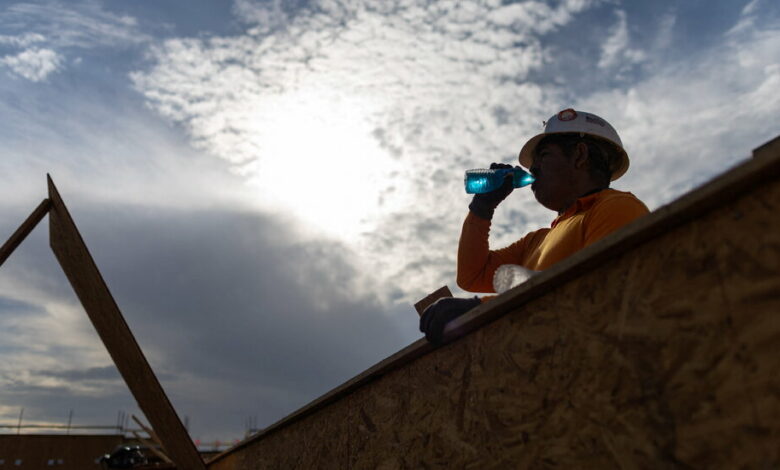Dozens of groups urge FEMA to recognize extreme heat as a ‘major disaster’

Dozens of environmental, labor and health care groups gathered Monday to file a petition to prompt the Federal Emergency Management Agency to declare extreme heat and smoke from wildfires “major disasters” such as flooding and tornadoes.
The petition is an important effort by the federal government to help states and local communities burdened by the rising costs of climate change.
If the petition is accepted, FEMA could free up money to help communities prepare for heat waves and wildfire smoke by building cooling centers or installing air filtration systems in schools. The agency could also help during emergencies by paying for water distribution, health checks for vulnerable people and increased electricity use.
“Major disaster declarations really open up the widest pockets of funding that FEMA has available,” said Jean Su, a senior attorney at the Center for Biological Diversity, an environmental organization, and the lead author of the petition. “State and local governments are severely underequipped and underfunded to even deal with emergency response.”
The support from major unions like the AFL-CIO and the Service Employees International Union is part of a broader union strategy to create protections for the tens of millions of people who work outdoors or without air conditioning during heat waves. Unions want the Occupational Safety and Health Administration to require employers to protect workers from extreme temperatures. The White House has pressured officials at the Department of Labor, which oversees OSHA, to release a draft of the heat regulation this summer. But major business and industry groups, such as the U.S. Chamber of Commerce, oppose new requirements.
Labor groups and employee rights organizations hope that if the petition to FEMA is accepted, there will be more pressure on employers to address workplace heat.
“If extreme heat and smoke from wildfires are classified as major disasters, then it’s all hands on deck,” said Christine Bolaños, communications director for the Workers Defense Project, a nonprofit that focuses on labor rights. A major disaster classification would force OSHA to make protecting heat workers a priority, she said.
The move underlines growing concerns about the impact of extreme heat among lawmakers, activists and labor groups. Last June, Representative Ruben Gallego of Arizona, a Democrat, legislation introduced to declare extreme heat a major disaster according to FEMA’s classification. The bill, which has made no progress, was co-sponsored by 11 Democrats but only one Republican.
According to the National Weather Service, heat already kills more people in the United States each year than hurricanes, floods and tornadoes combined. Yet the tools to tackle the consequences of extreme temperatures are being built from scratch.
“None of the institutions, tools, datasets, and so on in the world are fit for purpose in responding to the magnitude of extreme heat that communities are experiencing,” said Kathy Baughman McLeod, CEO of Climate Resilience for All, a nonprofit focused on tackling climate change and extreme heat worldwide.
Over the years, FEMA has rejected several similar requests to declare several previous heat waves major disasters, including one from California Governor Gavin Newsom in October 2022 after a record-breaking triple-digit heat dome formed across the state. At the time, the agency argued that “precedent is to evaluate individual events and impacts, not seasonal or overall atmospheric conditions.”
The 1988 Stafford Act, which authorizes the federal government to declare a disaster or emergency, does not explicitly include extreme heat in its list of sixteen causes. But the labor and environmental groups’ petition argues that the agency declared the coronavirus pandemic a major disaster even though it was also not on the list, opening a precedent that the groups hope to exploit. The petitioners plan to litigate the case if FEMA denies the request again.
Declaring extreme heat events as major disasters could pose challenges for FEMA. Generally, the agency declares disasters based on how much uninsured public infrastructure was damaged and how many people died. But during heat waves, damaged property does not pose the greatest risk, and counting heat-related deaths is difficult, in part because death certificates do not always reflect the role heat played in a person’s death.
During disasters, communities that don’t prepare for extreme events can sometimes receive more money than communities that do, says Brock Long, who served as FEMA administrator during the Trump administration.
Mr. Long said he worries that adding new items to the list of FEMA’s worst disasters would be like “attaching new parts to a rusty old bicycle frame.”
“It’s time for Congress to sit down with major infrastructure owners and community leaders about how we can redesign a system that makes sense,” Mr. Long said. “Under the existing system, we will never be able to address the changing climate or threats to the future.”
If FEMA accepts the petition, it will begin a process to amend its rules to include extreme heat and wildfire smoke as potential major disasters and accept public comment.




